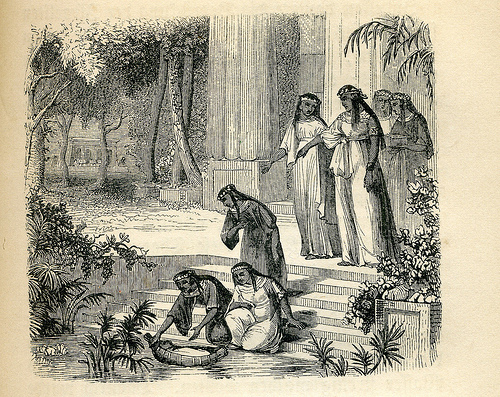Written by: Sarah Carter
Moses: Moses, an Old Testament prophet and leader during biblical times (specifically during the Old Testament period[1]), grew up in the royal court of the Pharaoh of Egypt but was born of Hebrew descent.
In the first chapter of the book of Exodus, a decree was declared by the Pharaoh that all baby boys of Hebrew lineage must be killed. In response to this alarming news, Moses’s mother Jochebed, along with his sister Miriam, promptly transported him down the Nile River in a basket of reeds in the hopes that he would be sheltered from the impending danger (see Exodus chapter 2, verse 3). As the Pharaoh’s daughter washed in the river along with her maidservants, she eventually noticed a mysterious receptacle hidden within the bulrushes (see Exodus chapter 2, verses 5-6). Even though she realized that the baby within the basket was of Hebrew birth, she still decided to keep the child to raise him as her own (see Exodus chapter 2, verse 6,10). Soon afterwards, Moses’s sister Miriam suggested to the Pharaoh’s daughter that she knew a women (Jochebed) who could nurse the baby until he was old enough to live in the palace (see Exodus chapter 2, verses 7-10). Consequently, the majority of his infancy was spent in his Hebrew household with his mother and family, even though he lived in the Pharaoh’s palace and was treated as an Egyptian noble for the majority of his youth and young adulthood.
In the second chapter of the book of Exodus, Moses inadvertently murdered an Egyptian who was abusing an Israelite slave, causing him to immediately flee the country and reside in the wilderness (see Exodus chapter 2, verses 11-15). While in the wilderness, Moses encountered God in the form of a burning bush (see Exodus chapters 3-4), which initially informed him of his high calling as the divinely appointed leader and deliverer of the Israelite people. However, only when the Pharaoh dies is Moses fully capable of finally helping the Israelites achieve liberation from their status as slaves. Ultimately, Moses instructed the Israelites and guided them on their journey toward the sacred Promised Land, or the Land of Canaan.[2] He also presented the Ten Commandments[3] to the Israelite people and firmly instructed them to obey and keep the laws and regulations that were established therein.
Moses did not decide to become the leader of the Israelites and to deliver them out of slavery[4] on his own terms; he was specifically appointed by God for this mission in order to fulfill specific purposes for his life and the lives of the Israelite people. Because Moses decided to follow God’s plan, he willingly gave up fame and fortune as an Egyptian royal and instead committed to developing a submissive spirit and a heart full of devotion for the Lord.
In summary, Moses[5] is considered an example of an “Orphan” hero because he not only grew up apart from his real family and acquired a mentor figure (Yahweh, or God[6]), but he also became an authoritative lawgiver and powerful leader who accomplished great feats and overcame great obstacles throughout his lifetime.
______________________________
[1]To read more specifically about the historical and literary context of biblical times, see the following book: ed. Davis, Paul, et al. The Bedford Anthology of World Literature; The Ancient Word, Beginnings-100 C.E. (Boston: Bedford/St. Martin’s, 2004), 127-139.
[2]For more information on Moses and the journey the Israelites took to the Promised Land, see the following book: Alexander, T. Desmond. From Paradise to the Promised Land: An Introduction to the Pentateuch (Grand Rapids, MI: Baker Academic, 2012).
[3] To read the full text of the Ten Commandments, see the book of Exodus chapter 20 and the book of Deuteronomy chapter 5. More specifically, the Ten Commandments were two tablets of stone that were engraved by God himself when Moses went to meet with the Lord on top of Mount Sinai. However, while he was counseling with God on top of the Mount, Moses’s brother Aaron erected a calf made out of gold for the Israelite people to worship since the people were becoming impatient and dissatisfied with Moses. When Moses came down from the Mount and realized what the people had done, he threw down the Ten Commandments, completely destroying them. Because of this, the Ten Commandments had to be re-created on new tablets of stone. For more specific information on the story of the Ten Commandments, see the book of Exodus chapters 19-34 and the book of Deuteronomy chapters 5-6.
More specifically, see the following online Hebrew Biblical text resource: “A Hebrew-English Bible According to the Masoretic Text and the JPS 1917 Edition.” Mechon Mamre. 2005. Last edited 17 Oct. 2012. Web. Accessed 2 Oct. 2013.
[4] The first chapter of Exodus explains how the Israelite people were in bondage to the Egyptians, forced to daily engage in arduous labor.
[5] To read more specifically about Moses’s background information, youth, and appointment by God to liberate the Israelites from Egypt, (among other relevant topics), see the following book: Averbach, Elias. Moses (Detroit: Wayne State University Press, 1975). Also see the following book for additional information on the character of Moses: R. Swindoll, Charles. Moses: A Man of Selfless Dedication (Nashville, Tennessee: Word Publishing, 1999).
[6] God, or Yahweh, was not only Moses’s mentor, but also served as his main source of power when he performed miracles and other great feats, such as when Moses parts the Red Sea with his legendary staff (see the book of Exodus chapters 13-14).


